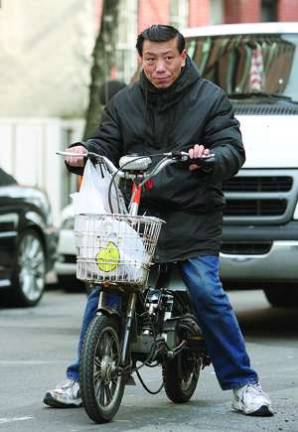DOT to Educate Small Businesses About Delivery Bike Safety

By Paul Bisceglio Following the City Council's approval of new safety regulations for commercial bicyclists earlier this month, a Department of Transportation representative met with Community Board 1's Quality of Life Committee last Thursday to detail the expected changes. "This is not about hammering down on small businesses that are already feeling pressure from the Health Department," said Suchitra Sanagavarapu, the representative. "This is to educate them." Restaurants throughout the city are notorious for hiring reckless delivery cyclists, who bike against traffic or on sidewalks en route to customers' homes. The new legislation will require commercial cyclists to wear reflective vests that display their business's name and a three-digit identification number unique to each rider. The bikes, too, will be required to have front and rear lights, a bell and a rear sign with the business's name and the bicycle's own unique ID number. In addition to new equipment, the legislation also will make the completion of bicycle safety courses mandatory for all commercial cyclists, to ensure that all riders have no excuses not to be riding with care. This particular bill is named after Stuart C. Gruskin, a man struck and killed by a bicyclist in Midtown three years ago. Sanagavarapu explained that these new rules aim to increase delivery bikers' knowledge and visibility, as well as to hold businesses accountable for their unlawful riders. To this latter end, the legislation includes a final bill that will grant DOT power to enforce the laws, allowing the department to issue summonses to businesses whose riders fail to comply. Sanagavarapu said that the New York City Police Department will continue to penalize individual cyclists for traffic violations, but DOT enforcement will push businesses themselves to encourage safe riding, because they are the ones held accountable. The Quality of Life Committee expressed mixed feelings about the legislation. Though all committee members agreed that unruly cyclists pose a danger to pedestrians-"Soon we're going to need to wear helmets on the sidewalk," one member remarked-some were pessimistic that the laws would actually be enforced. "Nothing is going to happen," argued one committee member after Sanagavarapu mentioned that the DOT's summonses would be complaint-driven; i.e. issued when citizens called 311 to report a commercial cyclist breaking the law. The member speculated that complaints would likely get lost in bureaucratic tangles and fail to result in penalties. He agreed with Sanagavarapu that at least attempting regulation is a good step, but emphasized that enforcement should be strict. "I think you should really go after [violators] and tell them that this is serious," he said. The committee did not go into any detailed discussion of the legislation's effects on small businesses, though the bills' opponents argue that the laws unjustly target lower-income residents to garner easy revenue for the city. "I guess Chinese food prices are going to go up now that all the restaurants are going to be ticketed," quipped one attendee. Mayor Michael Bloomberg is expected to sign the legislation within the next two weeks. DOT has said that they will begin to enforce the new laws in January, and will work to educate all businesses owners about the rules before then. The department will hold two information sessions downtown for businesses owners at Pace University on Nov. 5 and 16.